What is Nylok, Why this is considered to be one of the most powerful anti-loose solution in the world?
14237 Views |

Nylok® is a technology which nylon patch is applied to screw threads to provide a powerful anti-loosening function.
Among the various types of anti-looseness screws, it has many unique features, such as the fact that it can be processed for both male and female screws, and that it can be used repeatedly. This is a product that Hanshin Neji are proud to offer to customer. In this article, we will introduce the mechanism of the Nylok® technology and its awesomeness in two issues.
Nylok® can be apply in a wide range of industries and application due to their high safety level.
Nylok® has been using by NASA satellites and many of the world's leading automobile, aircraft, machinery, and electrical appliance manufacturers. It also passed the Food Sanitation Law of Japan, this made Nylok® can be distribute to various industries application in Japan, including food manufacturing machinery, medical equipment, and nursing care equipment. It is used in many parts of Japan's Shinkansen bullet trains, such as windshield wipers at the very front of the train, door parts, screws that fasten to window frames, piles that fasten railroad tracks, overhead wires, and many other parts. Shinkansen trains run at speed exceeding 300 km/h, which causes tremendous vibration, but we have rarely heard of a serious accident caused by loosing screws. From the high safety and high quality of Nylok®'s products, it is a remarkable result of how effective they are in anti-loosening screw function.

▲ Nylok® technology supports the safe operation of the Shinkansen.
“Anti-loosening Screws function” that can be used repeatedly
The greatest feature of Nylok® is "Anti-loosening Screw function" that can be used repeatedly. The ISO standard for "Anti-loosening Screws" explained that after tightening a screw, the return torque (torque when loosening the screw) must be measured and must be above a certain value. The blue line in the figure below shows that the torque value of the Nylok® applied screw decreases from the first time to the second time, then to the third time, and then, but the value is constant from about the seventh time. The reason why the value decreases from the first to the second time and then because Nylok® is made of nylon, Nylok®'s shape after fastened will become flatter and cover the thread of the screw, this made the very first value reduce greatly. However, this value is much higher than the minimum return torque value set by the ISO. This means that even after repeated use, the screw remains highly effective as an anti-loosening screw.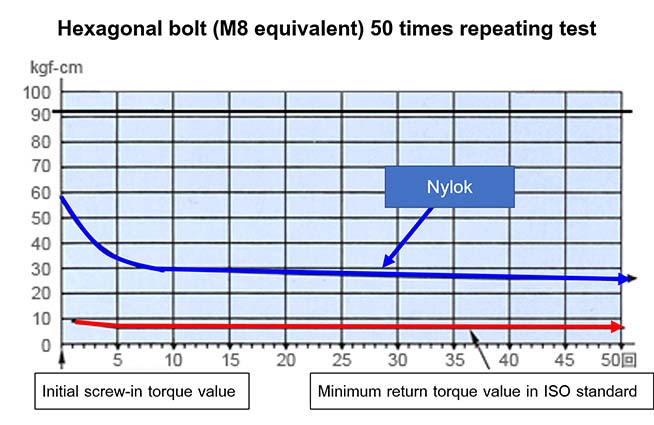
▲ Graph of change in torque values resulting from repeated testing of a hexagonal bolt with the Nylok® processing
* Information materials provided by Taiyo Sanko Co., Ltd.
"Can be apply for many types of fasteners in various sizes and materials"
Another feature of Nylok® is, It can be apply for many types fasteners in various sizes and materials. Anti-loosening screws are often made on nuts and washers, but Nylok® can be applied to either male or female threads. Nylok® can be processed with not only general standard products such as cap screws, set screws, small screws, and hexagon bolts but also with customized products. Also, depending on the shape, it is possible to apply on fine M1 screws and also large screws such as M24, alloy steels such as iron, SCM435, and stainless steel.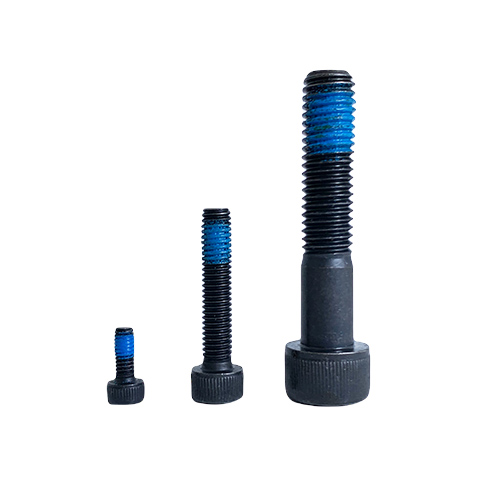 ▲ Sample of Nyloc processed products
▲ Sample of Nyloc processed products
*Application for special material is required consult from us first, such as brass which are difficult to apply.
How screws can be fasten and loosen?
For you to understand how Nylok® works, firstly you need to know "why screws can be fastened?" and "why they become loosen?" This is because all anti-loosening function products, including Nylok®, they follow the principle of screw fastening.
Screws can remain fastened with the axial force and frictional force generated when they are fastened. When screw is fastened, the screw will be pulled from the place where it has been. From that moment, a force that causes the screw return to its original state, which is an axial force will be generated. When this axial force is generated, the frictional force is also generated on the faced surface (surface or threaded part) of the male and female threads, then the screws can be fastened.
So, on the other hand, why do screws come loose? It occurred when its axial force and frictional force drop. There is always a gap between male and female threads. Without the gap, it cannot be fit or insert. However, if there is vibration, shaking, or impact occurred after the screw is fastened, there will be invisible power that reduce the force. The reduction in the axial force causes the frictional force to decrease and the screw to loosen.
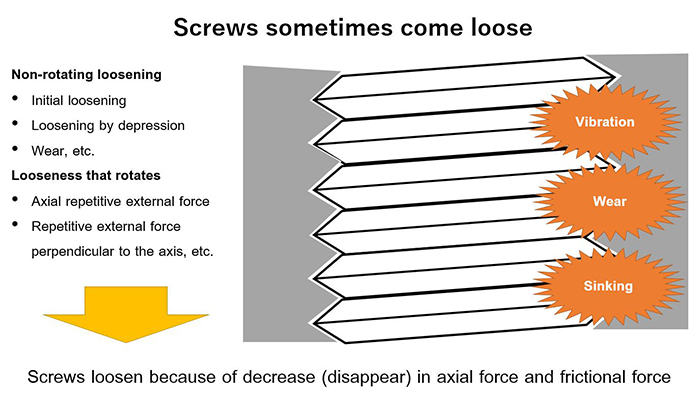
Principle of Nylok®'s fastening
Nylok® is balancing "axial force" and "frictional force" when fastening. All types of anti-loosening screws, such as spring washers, flat washers, and those with flanges are also use this principle. Nylok® is a technology which designed to increase and maintain the frictional force and to make it as easy as possible to install.
As shown in the figure below, Nylok® is not apply all around but it is basically applied on partial thread only.
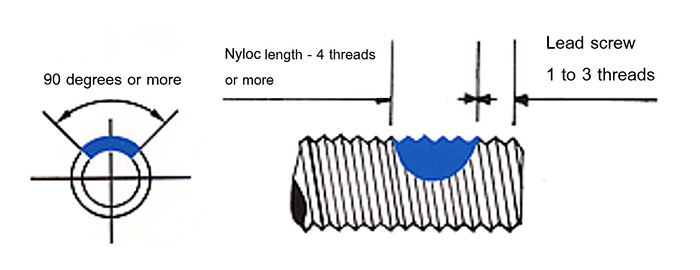
▲ Standard male screw - Nylok® processing position
Standard male screw - Nylok® processing position
When a screw with Nylok® is fastened, it will be become very tight so that it cannot be fasten by hand from the point of engagement. It can be tightened with a tool such as a screwdriver, wrench, or spanner, but for Nylok® which is made of nylon, it is softer than metal and spread the shape along the threads. It can be tightened by hand, but once the Nylok® is spread over the thread, there is a force of returning occurred. For example, when a rubber ball is squeezed with a hand, it will shrink and sudden return its shape we undid, also a great force will be returned to the hand. That force is generated in the gap between the male and female threads.
When the screw is pushed into the opposite direction where Nylok® is not applied, also the frictional force will be generated on the metal-to-metal contact surface, creating a locking effect. The Nylok® processing is also reduces the original gap between the male and female threads, which makes it difficult to move in the return direction even if there are vibration or shaking occurring.
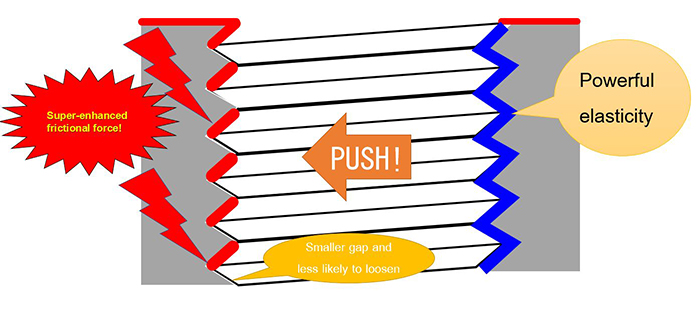
Nylok® can be installed in the same way as ordinary screws. As for the tightening torque, the loosening prevention effect will be greatly enhanced just by tightening with the same value as it is.
Nylok® processed products can be sold in Japan as in few as just as one piece!
Nylok® processed products are coated at the factory before being supplied to customers. Generally, unit price will be higher when the quantity is small because there are a fixed cost for the process. However, at Hanshin Neji, we have created a standard specification that can be used for general purposes by many of our customers, and Nylok® processed products are stocked in advance at our head office in Japan and ready to ship from Japan to the world.
Example of in-stock items
・ Hexagon socket head cap screw
・ Hexagon socket countersunk screw
・ Hexagon socket set screw
・ Hexagon bolt
・ Stainless steel machine screws (pan, countersunk, truss)
・ Nut
We can supply even from one piece, so please feel free to contact us for more information.
* If you are considering using our products in security concerned areas such as for railroad vehicles or nuclear power plants, please be sure to let us know.



